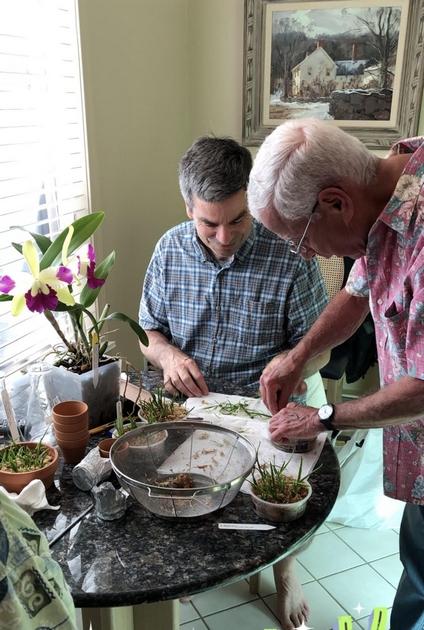By Dawny Gershkowitz / bedford@wickedlocal.com Mike Badia has been interested in plants since childhood. “My earliest memories are of the Long Island farm area where I grew up, of my grandmother growing flowers, growing and canning her own vegetables,” Badia said. His school summer jobs were on farms, “So my appreciation for plants and gardening was a logical offshoot.” Now Badia, a patent attorney at Vertex, is on the board of directors of the Massachusetts Orchid Society. How did he go from summer farm help to Orchid Society? By the time he got to college, where he studied to be a chemist, Badia already had an established interest in growing things. “A housemate’s plant just amazed me,” Badia said. “When this thick-leaved plant bloomed, it was unlike any flower I’d ever seen.” That Cattleya orchid marked the start of his passion for orchids. “At that time, about 40 years ago, orchids were unusual and expensive here,” Badia said. When he began working full time, a colleague’s orchid interest renewed his fascination. Badia learned about growing orchids in a sunroom, found a grower, and soon had a small collection. “By the mid-80s I was hooked,” he said. What’s so special about orchids? Today you can find orchids in a grocery store–something unheard of in the 1980s. What makes them special? “Orchids are one of the most diverse plants on Earth,” Badia said, “with about 25,000 species on every continent except Antarctica. There are orchids for every growing condition, and it can be as difficult or easy as a grower wants to make it.” Tell us what stories you would like to read in the Bedford Minuteman in this brief survey . Most orchids are epiphytes, anchored to other plants, like trees. “But they are not parasites,” Badia explained. “Orchids take nothing from host plants. When they’re not on trees, orchids need a medium that exposes roots to air, like a bark mixture.” One orchid seed pod can hold a million microscopic seeds. “It wasn’t until the 1950s people realized the seeds need a fungus that provides sugars. Then growers began […]






